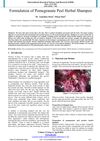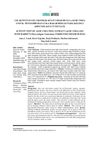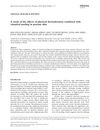 April 2023 in “International Journal of Science and Research (IJSR)”
April 2023 in “International Journal of Science and Research (IJSR)” Pomegranate peel shampoo can prevent hair loss and promote hair growth safely.
[object Object]  September 2022 in “Tạp chí Y Dược học Cần Thơ”
September 2022 in “Tạp chí Y Dược học Cần Thơ” Grapefruit peel essential oil with Gleditsia sinensis extract can make hair grow faster and longer in mice.
 1 citations,
March 2022 in “The Scientific World Journal”
1 citations,
March 2022 in “The Scientific World Journal” The cream made from cocoa pod peel can promote hair growth but may cause skin irritation.
 December 2020 in “Jurnal Wiyata: Penelitian Sains dan Kesehatan”
December 2020 in “Jurnal Wiyata: Penelitian Sains dan Kesehatan” Aloe vera peel extract gel helps speed up the healing of minor burns in rabbits.
 May 2023 in “Tạp chí Y Dược học Cần Thơ”
May 2023 in “Tạp chí Y Dược học Cần Thơ” The shampoo with grapefruit peel and Gleditsia sinensis helps mice grow hair faster, more, and longer.
Mangosteen peel extract may promote hair growth and darken hair color.
 February 2024 in “Jurnal Kesehatan Yamasi Makassar”
February 2024 in “Jurnal Kesehatan Yamasi Makassar” Pondoh salak fruit peel extract is effective in shampoo and has strong antimicrobial properties.
35 citations,
February 1993 in “International Journal of Dermatology” Cosmetic procedures can trigger pemphigus, an autoimmune disease.
8 citations,
January 2019 in “Journal of cosmetic dermatology” Modified phenol peels effectively reduced stubborn skin pigmentation in patients with Lichen Planus Pigmentosus.
 July 2022 in “International journal of Ayurvedic medicine”
July 2022 in “International journal of Ayurvedic medicine” The new herbal shampoo effectively controls dandruff using natural ingredients.
 87 citations,
March 2000 in “American Journal of Clinical Dermatology”
87 citations,
March 2000 in “American Journal of Clinical Dermatology” Alpha-hydroxy acids, like glycolic acid, safely improve skin issues and work on all skin types.
74 citations,
November 2000 in “Archives of Dermatology” Salicylic acid can safely exfoliate and regenerate skin without causing inflammation.
34 citations,
June 2005 in “Journal of cosmetic dermatology” Medium-depth peels are safer and effective for improving skin appearance compared to deep peels.
 5 citations,
October 2014 in “Journal of cosmetic and laser therapy”
5 citations,
October 2014 in “Journal of cosmetic and laser therapy” Combining physical dermabrasion with chemical peeling is more effective for skin treatment than chemical peeling alone.
 4 citations,
November 2016 in “Dermatologic Therapy”
4 citations,
November 2016 in “Dermatologic Therapy” Topical tretinoin may increase beard hair density.
 December 2024 in “Media Dermato Venereologica Indonesiana”
December 2024 in “Media Dermato Venereologica Indonesiana” Acne vulgaris was the most common skin disorder overall.
 May 1999 in “Journal of Oral and Maxillofacial Surgery”
May 1999 in “Journal of Oral and Maxillofacial Surgery” The book provides practical guidance on cosmetic facial surgery for clinicians.
 72 citations,
December 2009 in “Organic and Biomolecular Chemistry”
72 citations,
December 2009 in “Organic and Biomolecular Chemistry” Mercuric triflate is an effective catalyst for various organic reactions, working well at room temperature with high yields.
 16 citations,
January 2017 in “Anais brasileiros de dermatologia/Anais Brasileiros de Dermatologia”
16 citations,
January 2017 in “Anais brasileiros de dermatologia/Anais Brasileiros de Dermatologia” Managing frontal fibrosing alopecia and lichen planus pigmentosus is challenging due to resistant hair loss and skin discoloration.
 July 2019 in “Iconic Research And Engineering Journals”
July 2019 in “Iconic Research And Engineering Journals” The shampoo bar with Aloe vera and cinnamon oil improved hair health and protected against fungi without causing skin irritation.
 May 2018 in “Indian Journal of Plastic Surgery”
May 2018 in “Indian Journal of Plastic Surgery” The book is a detailed guide for plastic surgeons with clear explanations and is recommended for both new and experienced practitioners.
[object Object]  405 citations,
May 2007 in “Journal of The American Academy of Dermatology”
405 citations,
May 2007 in “Journal of The American Academy of Dermatology” Obesity affects skin health, causing conditions like acanthosis nigricans and may require different treatment approaches.
 153 citations,
October 2012 in “Skin Pharmacology and Physiology”
153 citations,
October 2012 in “Skin Pharmacology and Physiology” Caffeine in cosmetics may reduce cellulite, protect skin, and stimulate hair growth, but more research is needed on its use and effects.
 130 citations,
November 2017 in “Frontiers in Immunology”
130 citations,
November 2017 in “Frontiers in Immunology” The conclusion is that Treg-targeted therapies have potential, but more knowledge of Treg biology is needed for effective treatments, including for cancer.
 129 citations,
November 2005 in “Internal Medicine Journal”
129 citations,
November 2005 in “Internal Medicine Journal” Early detection and intensive treatment of diseases caused by Staphylococcus aureus toxins are crucial for reducing severe health effects.
 114 citations,
April 2004 in “International Journal of Dermatology”
114 citations,
April 2004 in “International Journal of Dermatology” Postinflammatory hyperpigmentation causes dark skin patches and needs personalized treatment.
 114 citations,
March 2002 in “Current opinion in oncology/Current opinion in oncology, with cancerlit”
114 citations,
March 2002 in “Current opinion in oncology/Current opinion in oncology, with cancerlit” Cancer therapy can cause various skin problems, including hair loss, skin darkening, painful hand-foot syndrome, and severe skin damage.
 101 citations,
October 2016 in “Nanomedicine: Nanotechnology, Biology and Medicine”
101 citations,
October 2016 in “Nanomedicine: Nanotechnology, Biology and Medicine” Fullerenes show potential in skin care but need more safety research.
 77 citations,
January 1989 in “Clinical Infectious Diseases”
77 citations,
January 1989 in “Clinical Infectious Diseases” Toxic Shock Syndrome progresses quickly, often involves multiple organs, and is linked to Staphylococcus aureus toxins, with treatment options available but diagnostic challenges remaining.
 76 citations,
February 2015 in “Industrial Crops and Products”
76 citations,
February 2015 in “Industrial Crops and Products” Researchers found over 40 compounds in Bituminaria bituminosa, including many flavonoids and some with potential for medical and hair care uses.

























